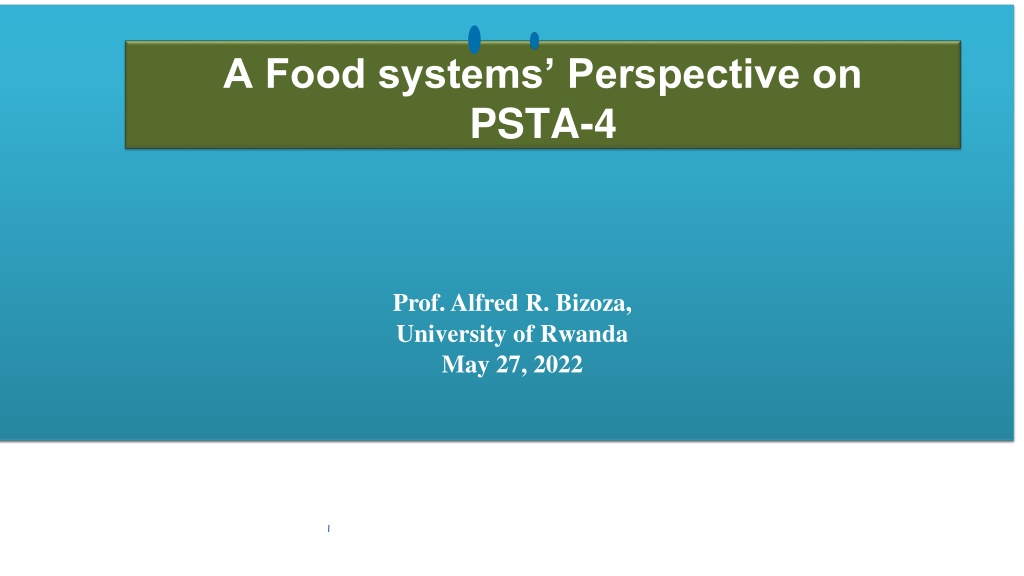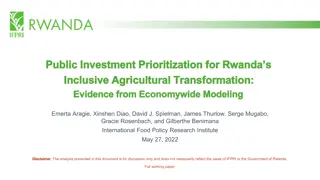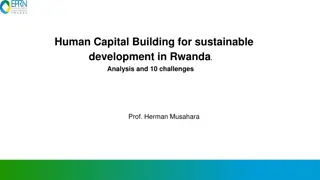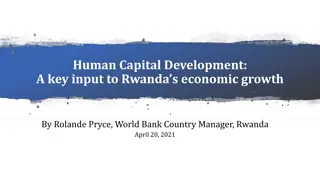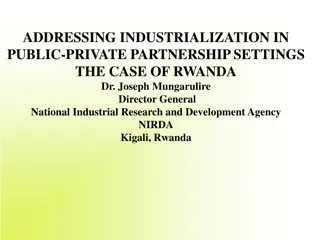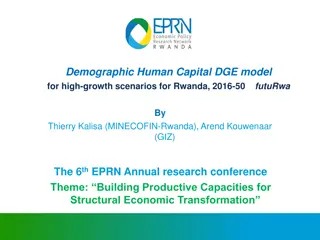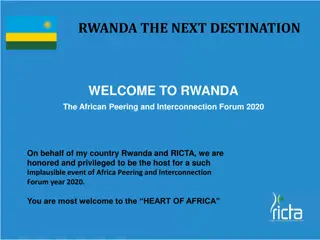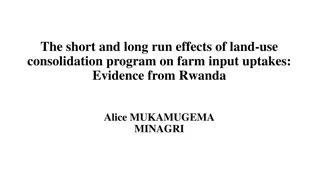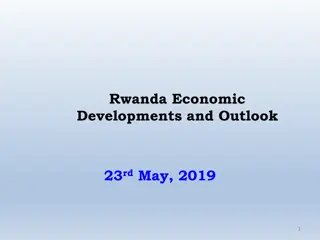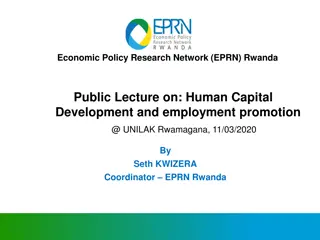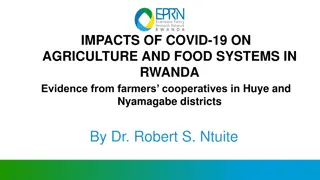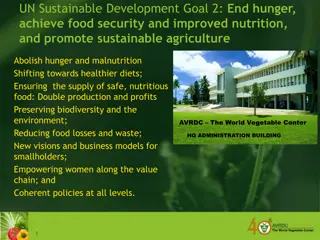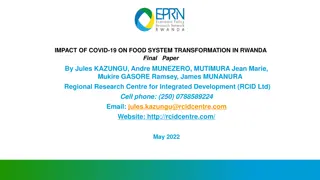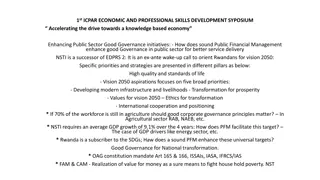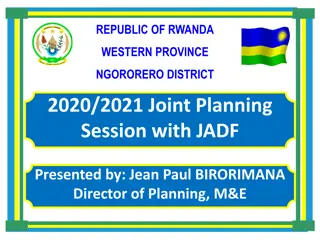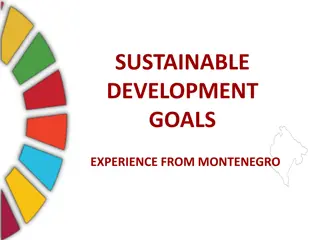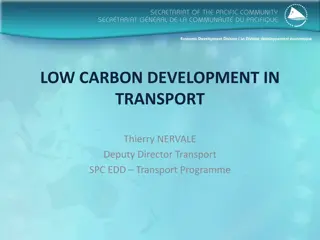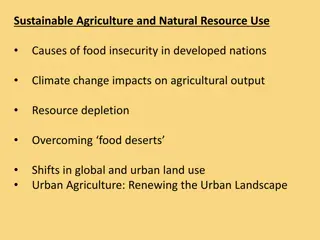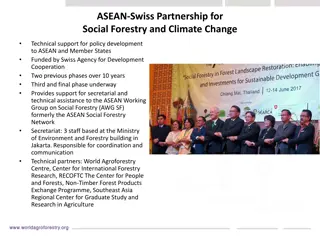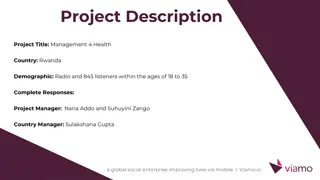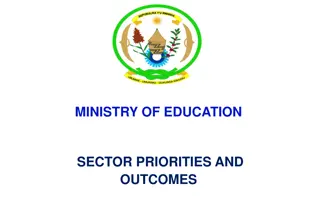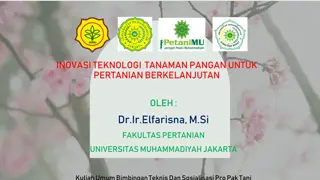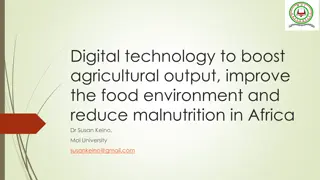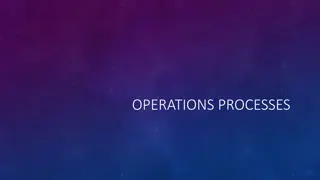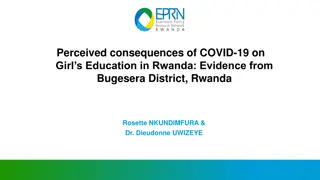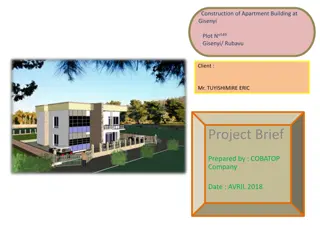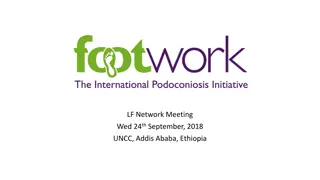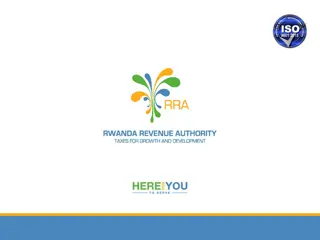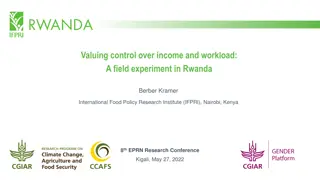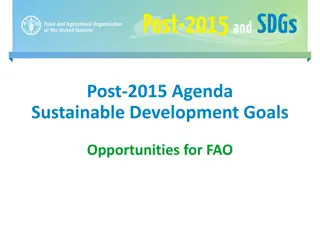Transforming Food Systems for Sustainable Development: Insights from Rwanda
A presentation by Prof. Alfred R. Bizoza at the University of Rwanda highlighted initiatives under the PSTA-4 framework, focusing on key areas such as food systems transformation, sustainable agriculture, and achieving SDGs by 2030. The session outlined the challenges faced by Rwanda in food security, nutrition, and livelihoods, emphasizing the importance of sustainability and ecosystem protection in global food systems.
Download Presentation

Please find below an Image/Link to download the presentation.
The content on the website is provided AS IS for your information and personal use only. It may not be sold, licensed, or shared on other websites without obtaining consent from the author. Download presentation by click this link. If you encounter any issues during the download, it is possible that the publisher has removed the file from their server.
E N D
Presentation Transcript
A Food systems Perspective on PSTA-4 Prof. Alfred R. Bizoza, University of Rwanda May 27, 2022 I
Outline of the presentation Introduction Priority areas of PSTA-4 Food Systems: Game Changers Concluding Remarks
Introduction Successive pre-summit phases till September 2021: Independent Dialogues organized by interested organizations, individual or Civil Society Organizations but still connected to the Summit; Member State Dialogues organized by national governments; and Global Summit Dialogues- aligned with key global events on major issues like climate change, environment, health, economies and jobs, humanitarian aid and water. These dialogues have created the space needed to gather diversified viewpoints, reveal the potentials of working together, and identification of national efforts for sustainable food systems by 2030.
Introduction (2) For the case of Rwanda, key results from the entire process of the Food Systems Summit of 2021 include: Pathways for Rwanda s Food Systems Transformation in Support of the SDGs 2030 Agenda, particularly SDG 1 (end extreme poverty), SDG 2 (zero hunger, improved nutrition, and sustainable agriculture), SDG 8 (decent work and economic growth), SDG 13 (climate action), and SDG 15 (terrestrial ecosystems, forests, and land). These are documented in the National Dialogues Report. Results from the landscape analysis done under Food Systems Transformative Integrated Policy Initiative (FS-TIP) project.
Food systems are beyond agriculture Food systems around the world are expected to deliver on a triple challenge . The first requirement is to ensure food security and nutrition for all. The second is to provide livelihoods to farmers and others in the food chain, and promote rural development. The third is to do all this while ensuring sustainable environment i.e. using natural resources sustainably (including protecting valuable ecosystems and biodiversity) and reducing greenhouse gas emissions
Major challenges in Rwandas FS Yield gaps of major crop and livestock commodities Diet quality and Nutrition Security: Limited production diversity to meet population's nutritional needs Prices of nutritious foods are still high, coupled with the low purchasing power of farmers, Livelihood s equity: Limited income and income growth for farmers are making agriculture unattractive with increasing urban migration. 7 Environmental resilience: High vulnerability to climate change
Major challenges in Rwandas FS Financing and investment: Too little financing channeled towards food production and agro-processing Vulnerable groups: A gap in addressing challenges faced by vulnerable groups in rural areas Infrastructure capacity: Under-developed supply chains due to weak logistics infrastructure and limited private sector investment: High losses & lower food quality. 8
Priority areas of PSTA-4 Innovation and Extension Productivity and Resilience Inclusive Markets and Value Addition Enabling Environment and Responsive Institutions
Food systems: Game Changers Game Changers on Nutritious foods (3a) Food systems transformation Game Changers on Game Changers Food and Environment Decent Livelihoods
What is a Game Changer? The choice of the game changers is driven by three main criteria: (1) the potential of the program to accelerate impacts and achievement of both national and sector level goals, (2) the ability of the programme to address the gaps observed in relevant food systems sub-sectors, (3) it presents a room to integrate the food systems approach. N.B. The logic is not to repeat existing programmes or interventions rather combine those strategies and programmes in a manner that responds to the challenge of inclusive and sustainable food systems in Rwanda. The following chart depicts this reasoning in the prioritization of food systems programmes.
National goals (Vision 2050, NST1 Food Systems programmes/Flagships Sector Strategic Plans Figure Figure 1 1: : Food Food systems systems integrated integrated approach approach
Identified game changers Game Changer #1: Nutritious Food Programs. Game Changer #2: Food Waste and Loss Management Game Changer #2 : Inclusive Markets and Food Value Chains. Game changer #4: Sustainable and resilient food innovation systems. Game changer #5 Inclusive innovative financing/investment. Game changer #6: Effective mainstreaming of youth and women in food systems.
Priority game changers/ Indicative Priority programmes Priority Programmes Game changer School feeding programme Early Childhood Development Programme (ECD) Social food safety nets Enabling environment for private sector led food loss and waste management National strategic Diversified food reserves Improved market access Food safety programs Climate resilient and regenerative agriculture Knowledge exchange and customised extension services. Game Changer #1: Nutritious Food Programs. Game Changer #2: Food Waste and Loss Management. . . Game Changer #3: Inclusive Markets and Food Value Chains. Game changer #4: Sustainable and resilient food innovation systems. Inclusive and innovative financing schemes for small scale farmers Public Private Partnerships (PPPs) for investment in food systems (Processing, transport, storage/upstream components of value chains). Entrepreneurship Skills development Access to finance Game changer #5 Inclusive innovative financing/investment Game Changer #6: Youth and women Empowerment
Concluding remarks Food systems is increasingly considered globally as an integrated approach in the agriculture sector Agro-ecology and regenerative agriculture need to be integrated in the sector planning The on-going mid-term review of the PSTA-4 will need to integrate these game changers and accommodate the food systems approach towards sustainable agriculture transformation.
